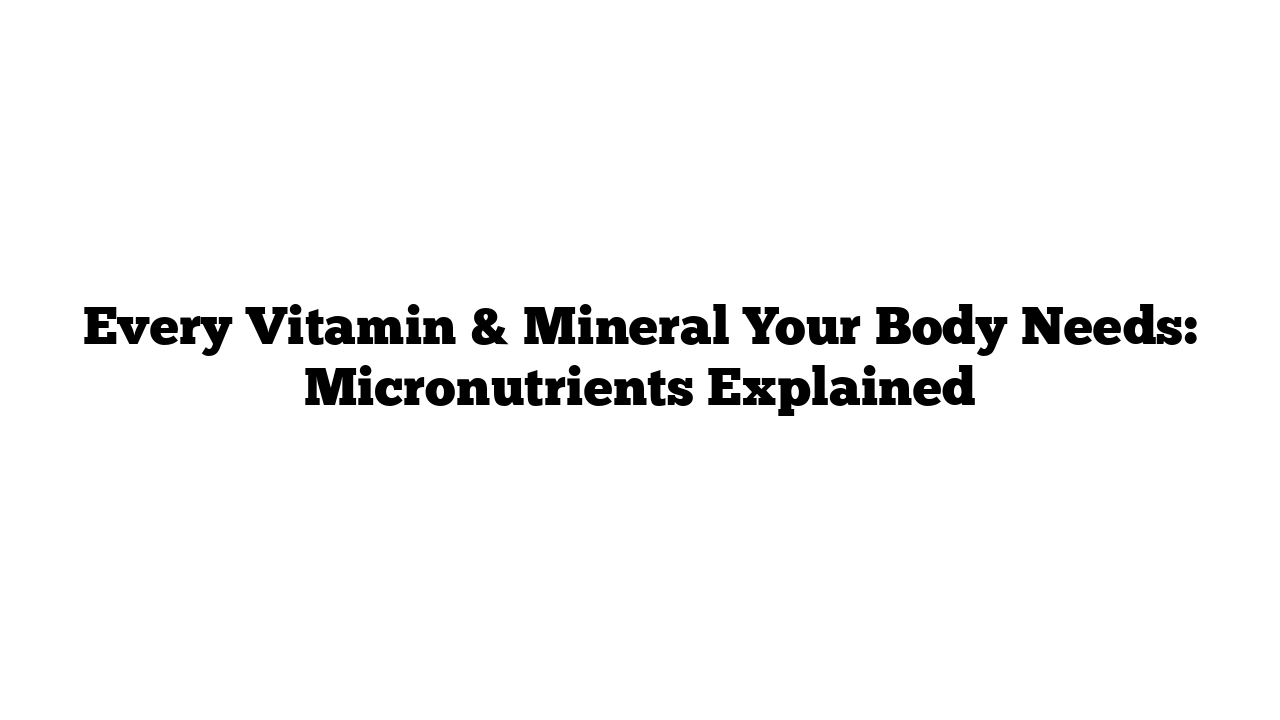Hello everyone! Welcome to Talon Nutrition. Today, we’re diving into an essential topic: micronutrients. While many of us are familiar with macronutrients—carbohydrates, fats, and proteins—micronutrients play a crucial role in our health and fitness too. So let’s break it down!
What Are Micronutrients?
Micronutrients include vitamins and minerals, which we need in smaller amounts than macronutrients. They don’t provide calories, but they help our bodies function properly. Today, we’ll explore each vitamin and mineral, how they work in our bodies, and what foods can help you get enough of them.
Vitamins
Vitamin A
Vitamin A, or retinol, is vital for good vision and immune health. It also supports bone development and may help protect against certain types of cancer. You can find vitamin A in foods like eggs, shrimp, milk, carrots, and pumpkin.
Vitamin B1 (Thiamin)
Thiamin helps convert food into energy and is important for healthy skin and the nervous system. Good sources include pork chops, salmon, and soy products.
Vitamin B2 (Riboflavin)
Riboflavin also aids in energy conversion and supports healthy blood. You can get vitamin B2 from milk, whole grains, and leafy greens.
Vitamin B3 (Niacin)
Niacin has a similar role to the previous B vitamins, helping turn food into energy while supporting circulation. Look for it in poultry, mushrooms, potatoes, and peanut butter.
Vitamin B5 (Pantothenic Acid)
This vitamin helps create lipids, neurotransmitters, and hormones like testosterone. Good sources are chicken, broccoli, avocados, and tomato products.
Vitamin B6 (Pyridoxine)
Vitamin B6 regulates amino acids that impact your sleep, appetite, and mood. It also helps make red blood cells. Find it in fish, legumes, potatoes, and bananas.
Vitamin B7 (Biotin)
Biotin is essential for synthesizing glucose and breaking down fatty acids. It’s important for healthy bones and hair. Good sources include whole grains, meats, egg yolks, and soybeans.
Vitamin B9 (Folic Acid)
Folic acid is crucial for cell creation and is especially important for pregnant women. You can get it from asparagus, okra, spinach, and orange juice.
Vitamin B12 (Cobalamin)
Vitamin B12 helps make new cells and preserves nerve cells, red blood cells, and DNA. Good sources are meat, poultry, fish, milk, and eggs.
You might wonder about other B vitamins like B4, B8, B10, and B11. They’ve been reclassified as other nutrients. For example, choline behaves like a B vitamin, aiding in neurotransmitter production. You can find choline in milk, eggs, salmon, and peanuts.
Vitamin C (Ascorbic Acid)
Vitamin C is a powerful antioxidant that protects your cells from damage. It also supports eye health and can reduce the risk of certain cancers. Good sources include citrus fruits, broccoli, bell peppers, and strawberries.
Vitamin D (Calciferol)
Vitamin D helps maintain normal calcium and phosphorus levels in your blood, which is crucial for bone health. You can get vitamin D from fortified milk, butter, and fatty fish.
Vitamin E (Alpha-Tocopherol)
Vitamin E is another antioxidant that protects other nutrients like vitamin A. It may help prevent Alzheimer’s disease. Find it in vegetable oils, leafy greens, whole grains, and nuts.
Vitamin K (Phylloquinone)
Vitamin K is essential for blood clotting and activates proteins necessary for this process. Good sources are cabbage, liver, broccoli, and kale.
Minerals
Calcium
Calcium builds and protects bones and teeth and helps with muscle contraction and blood clotting. You can find calcium in dairy products, tofu, kale, and salmon.
Chloride
Chloride balances fluids in your body and aids digestion. It’s often found in table salt.
Chromium
Chromium enhances insulin activity, helping maintain normal blood sugar levels. Good sources include meat, eggs, poultry, nuts, and cheese.
Copper
Copper helps metabolize iron and supports the immune system. Good sources are liver, shellfish, nuts, seeds, and beans.
Iodine
Iodine is essential for thyroid hormones, which regulate metabolism. You can find iodine in iodized salt and seafood.
Iron
Iron moves oxygen throughout your body and is necessary for chemical reactions that produce amino acids, collagen, hormones, and neurotransmitters. Good sources are meat, poultry, eggs, green vegetables, and whole grains.
Magnesium
Magnesium is needed for many chemical reactions and supports muscle function, blood pressure regulation, and bone health. Find it in spinach, broccoli, cashews, whole wheat, and milk.
Manganese
Manganese supports bone formation and metabolizes amino acids, cholesterol, and carbohydrates. You can find it in fish, nuts, legumes, and whole grains.
Molybdenum
Molybdenum helps process proteins and DNA and breaks down toxic substances. Good sources include nuts, milk, and legumes.
Phosphorus
Phosphorus builds and protects bones and teeth and helps convert food into energy. Look for it in dairy products, meat, eggs, potatoes, and almonds.
Potassium
Potassium helps balance fluids, supports muscle contractions, and maintains your heartbeat. It may lower blood pressure and support bone health. Good sources include bananas, avocados, grapefruit, and fish.
Selenium
Selenium is an antioxidant that protects cells and helps regulate thyroid hormones. Good sources are meat, fish, and walnuts.
Sodium
Sodium balances fluids in your cells and is necessary for nerve impulses and muscle contractions. It’s commonly found in table salt.
Sulfur
Sulfur stabilizes protein structures and contributes to healthy hair, skin, and nails. You can find sulfur in meats, fish, poultry, nuts, and legumes.
Zinc
Zinc helps create new cells and is vital for immune function, wound healing, and taste and smell. Good sources include red meat, oysters, beans, and nuts.
Putting It All Together
As you can see, there’s a lot happening in the world of nutrition! But don’t stress. Just eating a balanced and colorful diet will usually cover all your bases.
